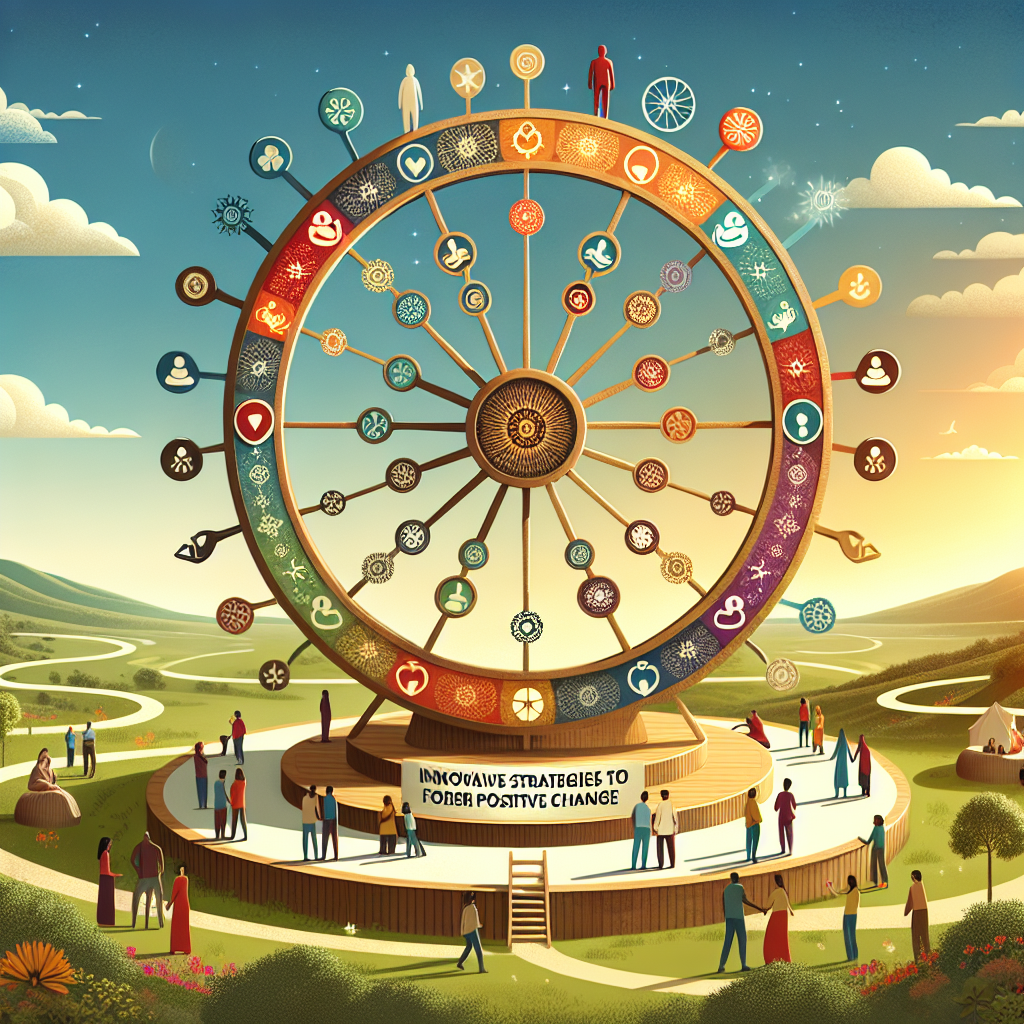Karma in Action: Innovative Strategies to Foster Positive Change
Introduction
The concept of karma, rooted in ancient eastern philosophies, has transcended its spiritual origins to become a powerful motivation for personal and societal transformation. At its core, karma suggests that every action we take has consequences, fostering a profound understanding of interconnectivity and responsibility. In an age marked by complex social issues and ecological crises, the idea of karma implores us to consider how our behavior—a blend of intentions and actions—can lead to significant positive change. This article delves into innovative strategies that leverage the principles of karma to foster positive change within communities, organizations, and individually.
Understanding Karma
Before exploring innovative strategies, it’s essential to grasp the essence of karma. It defines a moral law of cause and effect, emphasizing that good actions lead to positive outcomes while harmful actions yield negative repercussions. The implications of this principle extend beyond individual lives; when applied collectively, karma can transform communities and even societal structures.
Karma operates on multiple levels—personal, social, and environmental. The way we treat ourselves, others, and the planet can create ripples of change that reverberate far beyond our immediate surroundings. Recognizing this interconnectedness can inspire action toward building a more equitable, sustainable, and compassionate world.
The Role of Intentions in Action
While actions are critically important, intentions form the bedrock of karma. Positive intentions can amplify the impact of our actions, while negative motivations can taint good deeds. Hence, cultivating a mindset focused on altruism, empathy, and respect becomes vital.
Mindfulness Practices
One innovative approach to fostering positive intentions is through mindfulness practices. By nurturing greater awareness of our thoughts and emotions, we can align our actions with our core values. Techniques like meditation, journaling, and reflection encourage individuals to pause before reacting, allowing them to choose responses that contribute positively to their environment.
For instance, by integrating mindfulness programs into workplaces or educational institutions, we can create cultures that prioritize compassion and empathy. Employees and students become more equipped to handle conflicts amicably and engage in positive social interactions. This practice not only enhances individual well-being but also fosters a sense of community anchored in understanding and cooperation.
Collaborative Community Initiatives
Positive change often arises through collaborative efforts within communities. By harnessing diverse perspectives and resources, communities can create innovative solutions to complex challenges.
Participatory Action Research
Participatory action research (PAR) is one strategy that involves community members in the research process, empowering them to identify issues and co-create solutions. This approach not only values the knowledge and experiences of community members but also fosters a collaborative spirit. As each participant contributes their unique insights, the collective intelligence of the group can lead to significant positive outcomes.
For example, a neighborhood struggling with high crime rates might engage in PAR to understand the root causes of violence. Residents can share their experiences, collaborate with local law enforcement, and develop strategies that address underlying issues, such as poverty or lack of access to education. Through this process, communities can transform their environments and foster a sense of unity and resilience.
Environmental Stewardship
As global challenges like climate change loom, the idea of karma becomes particularly relevant in how we interact with the planet. Our actions towards the environment have profound consequences, not only for ourselves but for future generations.
Innovative strategies to enhance environmental stewardship include:
Educational Programs
Implementing educational programs that emphasize sustainability and environmental responsibility can instill a sense of karma in future generations. Schools can create curricula that teach students about their ecological footprint, the importance of biodiversity, and the consequences of pollution. Such programs can inspire young individuals to practice sustainable habits that benefit their communities.
For instance, integrating hands-on activities like gardening, recycling campaigns, or nature conservation projects can foster a personal connection to nature. When students see the tangible effects of their actions on the environment—like planting trees or cleaning up local parks—they begin to understand the karmic relationships between their actions and the ecosystems around them.
Creating Positive Work Environments
In organizations, fostering a culture of positivity can yield significant benefits for employee morale and productivity. One way to institutionalize positive practices is through recognizing and rewarding kind and ethical behavior among employees.
Employee Recognition Programs
Implementing employee recognition programs that celebrate acts of kindness, collaboration, or ethical decision-making can reinforce the idea of karma in the workplace. By openly acknowledging positive behaviors, organizations can create an environment where individuals feel valued for their contributions—leading to higher engagement and job satisfaction.
For example, a company might establish a "Karma Award" given monthly to employees who exemplify teamwork or display exceptional customer service. This not only boosts morale but creates a ripple effect, encouraging others to embrace similar values and behaviors.
Promoting Work-Life Balance
Additionally, organizations can implement policies that prioritize work-life balance, allowing employees to pursue personal passions and engage in community service. By fostering a sense of well-being, companies enable employees to cultivate positive intentions both inside and outside the workplace. This holistic approach can result in a workforce that is not only more productive but also committed to making positive contributions to society.
Leveraging Technology for Good
In today’s digital age, technology plays a significant role in shaping our actions and interactions. Innovative strategies that leverage technology can enhance the practice of karma in various ways.
Social Media for Positive Impact
Social media platforms can be powerful tools for spreading positivity and fostering community engagement. Campaigns that encourage users to share acts of kindness, support local initiatives, or raise awareness for social causes can create a culture of giving and activism.
For instance, the #RandomActsofKindness hashtag has inspired countless individuals to perform and share acts of generosity, reinforcing the notion that small actions can lead to substantial change. Organizations can also use social media to mobilize volunteers or promote fundraisers, fostering a sense of collective responsibility and support.
Crowdsourcing Solutions
Crowdsourcing platforms can facilitate the pooling of resources and ideas to address societal challenges. By enabling individuals to collaborate on projects that benefit their communities, technology can help generate innovative solutions to pressing issues.
For example, platforms like Change.org allow users to create and support petitions for social change. By uniting individuals around a common cause, these initiatives exemplify the power of collective action grounded in the principles of karma.
Building Empathy through Storytelling
Storytelling has been a timeless means of sharing experiences, and its role in promoting empathy cannot be overstated. By fostering connections through narratives, we can deepen our understanding of diverse perspectives and encourage compassionate action.
Community Storytelling Events
Organizing community storytelling events can create spaces for individuals to share their experiences, challenges, and triumphs. Whether through oral storytelling, written narratives, or multimedia presentations, these events can break down barriers and foster empathy among community members.
For instance, a community grappling with issues of inequality might host a storytelling night where residents share their experiences related to social justice. Such events can illuminate the complexities of these issues while encouraging dialogue and collaboration among participants.
Building Resilient Systems
For positive change to be sustainable, it’s essential to build resilient systems that can adapt to challenges and persist over time. Here, karma resonates through the understanding that our actions today can shape a better tomorrow.
Systems Thinking Approach
Adopting a systems thinking approach can enhance problem-solving efforts by considering the larger context within which challenges exist. This methodology encourages individuals and organizations to recognize the interconnectedness of various elements in a system, leading to more effective and holistic solutions.
For example, an organization addressing homelessness might engage stakeholders from various sectors, including housing, mental health, and employment. By understanding how these elements interact, they can devise comprehensive strategies that tackle the issue from multiple angles, ultimately leading to more significant and lasting change.
Conclusion
Karma serves as a profound reminder of the consequences of our actions and intentions, urging us to act with mindfulness and compassion. By embracing innovative strategies rooted in these principles, we can foster positive change within ourselves, our communities, and the broader world.
From cultivating empathy through storytelling to collaborating on community initiatives and leveraging technology for good, the possibilities for enacting positive karma are vast. Each action, no matter how small, contributes to a larger tapestry of change, shaping a future defined by kindness, understanding, and resilience.
The journey of karma in action is ongoing, and as we navigate the complexities of modern life, we have the opportunity to engage in meaningful actions that reflect our shared humanity. By fostering a culture of positive change, we not only honor the essence of karma but contribute to a more interconnected and compassionate world for generations to come.





